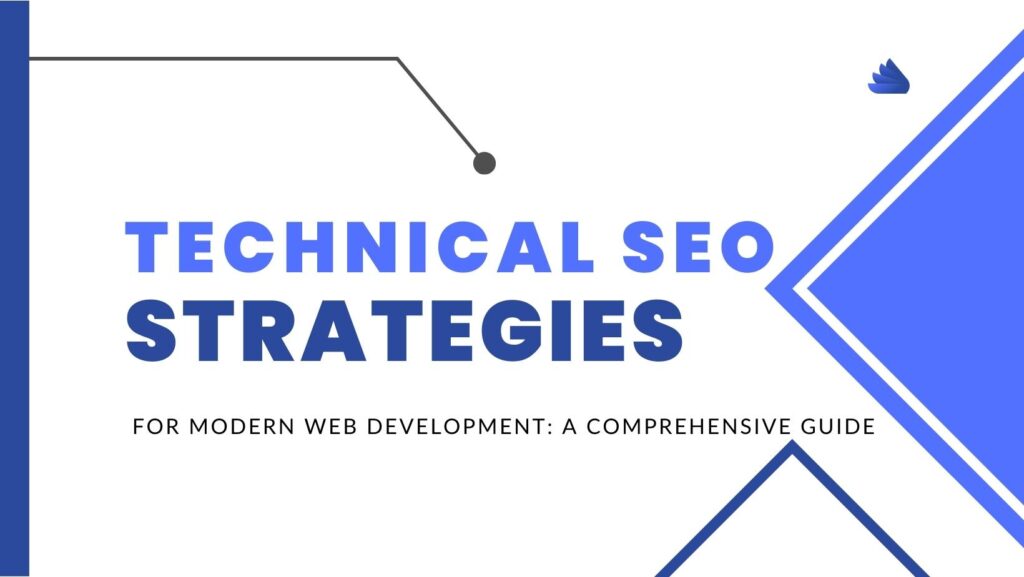Technical SEO has become a crucial component of contemporary site building as search engines become more complex. You may optimize your website to rank higher in search engine results, draw more organic visitors, and improve your online exposure by putting the proper technical SEO strategy in place. We’ll look at some of the best technical SEO strategy for contemporary site building in this article.
Technical SEO Strategy
Technical SEO involves enhancing a website’s technical components to raise its visibility and position in search engine results pages (SERPs). This entails, among other things, optimizing the website’s coding, speed, and mobile friendliness. Because technical SEO makes it simpler for search engines to crawl, index, and rank a website, it is essential for current web construction. Technical SEO enables search engines to comprehend the content and structure of a website.
Mobile-Friendly Design

Making sure your website is mobile-friendly is one of the most crucial technical SEO methods for contemporary web development. Your website must be mobile-friendly because mobile devices now account for more than 50% of all online traffic. This calls for making sure that your website is responsive, quick to load, and simple to use on a mobile device. Your website may be punished in search engine results if it is not mobile-friendly because Google now takes it into account as a ranking factor.
There are certain actions you may take to mobile-friendly your website. Start by employing a responsive design that adapts to the size of the user’s screen. This will guarantee that your website appears excellent and performs well across all platforms. To ensure that your photos and other material loads quickly on mobile devices, optimize them. Big graphics might harm user experience and slow down your website. The navigation of your website should be made simpler, and all buttons and links should be large enough to be clicked with ease on a mobile device.
Site Speed Optimization
Another crucial element in technical SEO Strategy and modern web construction is site speed. A website that loads quickly not only offers a better user experience, but it can also improve your search engine rating. Optimizing the speed of your website should be a top concern since Google has said that site speed affects rankings. Many methods, including picture compression, limiting HTTP requests, and speeding up server response time, can be used to accomplish this.
By measuring your current load time, you may begin to improve the speed of your website. Get a thorough analysis of the speed and functionality of your website using tools like Google PageSpeed Insights, GTmetrix, or Pingdom. You can alter your website to speed it up in response to the findings. Compressing images, limiting HTTP requests, and using fewer plugins or third-party scripts are some of the most efficient techniques. In order to offer material from servers closer to the consumer, you might also think about employing a content delivery network (CDN). This can greatly improve load times.
Structured Data Implementation
To make it easier for search engines to grasp the context and relevance of the content on your website, organize and mark it up with structured data. Structured data implementation can raise your website’s exposure in search engine results and its chances of appearing in rich snippets. There are other kinds of structured data that you may use, like Schema markup, which gives search engines more details about your content.
Use a markup language like JSON-LD, Microdata, or RDFa to deploy structured data on your website. It’s critical to comprehend the many categories of structured data and their potential applications because this can become a little complex. For instance, you can use Schema to annotate the product pages, events, reviews, and other content on your website. Search engines can better comprehend the purpose and relevance of your content by adding structured data to your website, which can increase your website’s exposure and ranking in search engine results.
Optimizing URL Structure
Your website’s search engine rating may be impacted by the URL structure. It is simpler for users to traverse your website and search engines to understand the content of a page with a well-structured URL. A poorly structured URL, on the other hand, can make it challenging for search engines to grasp the content and may have a negative effect on your ranking.
Creating informative and user-friendly URLs is the first step in optimizing the structure of your website. Instead of utilizing generic URLs like “www.example.com/page1,” employ descriptive keywords that accurately describe the page’s content. For instance, a URL like “www.example.com/blue-widget-product-page” is far more user- and search engine-friendly. Also, avoid using underscores in your URL to separate words because they could confuse search engines. Instead, use hyphens.
Website Security

Website security is crucial for preserving your search engine ranking as well as for safeguarding the data of your users. According to Google, websites that employ SSL encryption have a tiny ranking advantage. Website security has been identified as a ranking factor. A secure website can also increase user confidence and enhance their entire browsing experience.
Installing an SSL certificate, which encrypts data transferred between a user’s browser and your website’s server, is the first step in making your website secure. This will change the URL of your website, to begin with “https://” and let users know that it is safe. Update the software and plugins on your website frequently to keep them secure and up to date.
Conclusion
You may improve your website’s position, draw more organic visitors, and boost your online exposure by putting the tactics described in this tutorial into practice. Technical SEO Strategy is a crucial component of contemporary web construction. It’s crucial to comprehend the technical factors that can affect your search engine ranking whether you’re a web developer or a website owner and to take the appropriate steps to optimize your website.
To make sure that your website is optimized for both search engines and users, keep in mind to pay attention to mobile-friendliness, site speed, structured data implementation, URL structure, and website security. You can advance your website and boost its online success by implementing these technical SEO Strategy.



